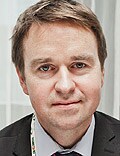October 8, 2012 (Vienna, Austria) — A large percentage of the public and healthcare professionals are not well informed about cancer risk factors, according to a survey conducted in Ireland. Many of the respondents overestimated risk factors that have not been definitively linked to cancer and underestimated well-established risk factors.
In addition, a good portion of the general public believes that the lifetime risk for cancer is nonmodifiable.
The survey results were presented here at the 2012 European Society for Medical Oncology (ESMO) Congress.

Dr. Derek Power
Derek Power, MD, a medical oncologist at Mercy and Cork University Hospitals, Ireland, and colleagues used a 48-question survey to assess knowledge about cancer risks in the general population and in healthcare professionals.
"We found that a sizable portion of the population is misinformed about cancer risk," said Dr. Power. "Many overestimate the risk attributable to genetics, environment, and stress, and underestimate age, obesity, and sunlight."
Most of the respondents were aware of classic risk factors, and 80% of the public and 78% of healthcare professionals were concerned about the risk for cancer, Dr. Power reported.
However, many myths still prevail. A large proportion believe that things such as wearing a tight bra, a blow to the breast, stress, or the use of mobile phones are major cancer risk factors, he said.
Overestimates and Underestimates
Of the 748 people who participated in the survey, 126 (17%) were healthcare professionals. The mean age of participants was 37 years.
The role genetics plays in cancer risk was greatly overestimated, said Dr. Power; 90% of both groups believe that genetics "strongly" increases risk. In addition, 79% of the public and 73% of healthcare professionals stated that more than 10% of cancers are inherited.
The top 5 factors considered to be cancer risks were smoking (87%), diet (76%), alcohol (42%), genetics (47%), and the environment (31%). Only 32% of the public and 41% of healthcare professionals were aware that obesity is a risk factor; in addition, only 33% of the public and 24% of healthcare professionals knew that the location of fat is important. In fact, 78% of healthcare professionals were unaware that abdominal fat can cause inflammation and secrete substances implicated in carcinogenesis.
Some respondents were unaware that risk increases with age (20% of the public and 10% of healthcare professionals), and 63% of the public and 82% of healthcare professionals believe that some alcoholic drinks are more dangerous than others.
The majority of respondents (86%) were aware that processed meat is a risk factor, and 46% knew that salt is a risk factor. However, 40% of the public and 28% of healthcare professionals were unaware that red meat consumption boosts risk.
The majority were also aware that berries, green tea, vegetables, and physical activity (30 min/day) can reduce risk.
This study highlights the fact that a large proportion of people do not like the idea of self-responsibility for personal cancer prevention, said Hans-Jörg Senn, MD, chair of the ESMO cancer prevention faculty, in a statement. "Rather, they blame genetics and society for getting cancer."
"Increasing awareness of the importance of primary cancer prevention is an enormous health/political issue for the future," he added.
The authors have disclosed no relevant financial relationships.
2012 European Society for Medical Oncology (ESMO) Congress: Abstract 1421. Presented September 30, 2012.
Medscape Medical News © 2012 WebMD, LLC
Send comments and news tips to news@medscape.net.
Cite this: Public Remains Largely Misinformed About Cancer Risks - Medscape - Oct 08, 2012.




